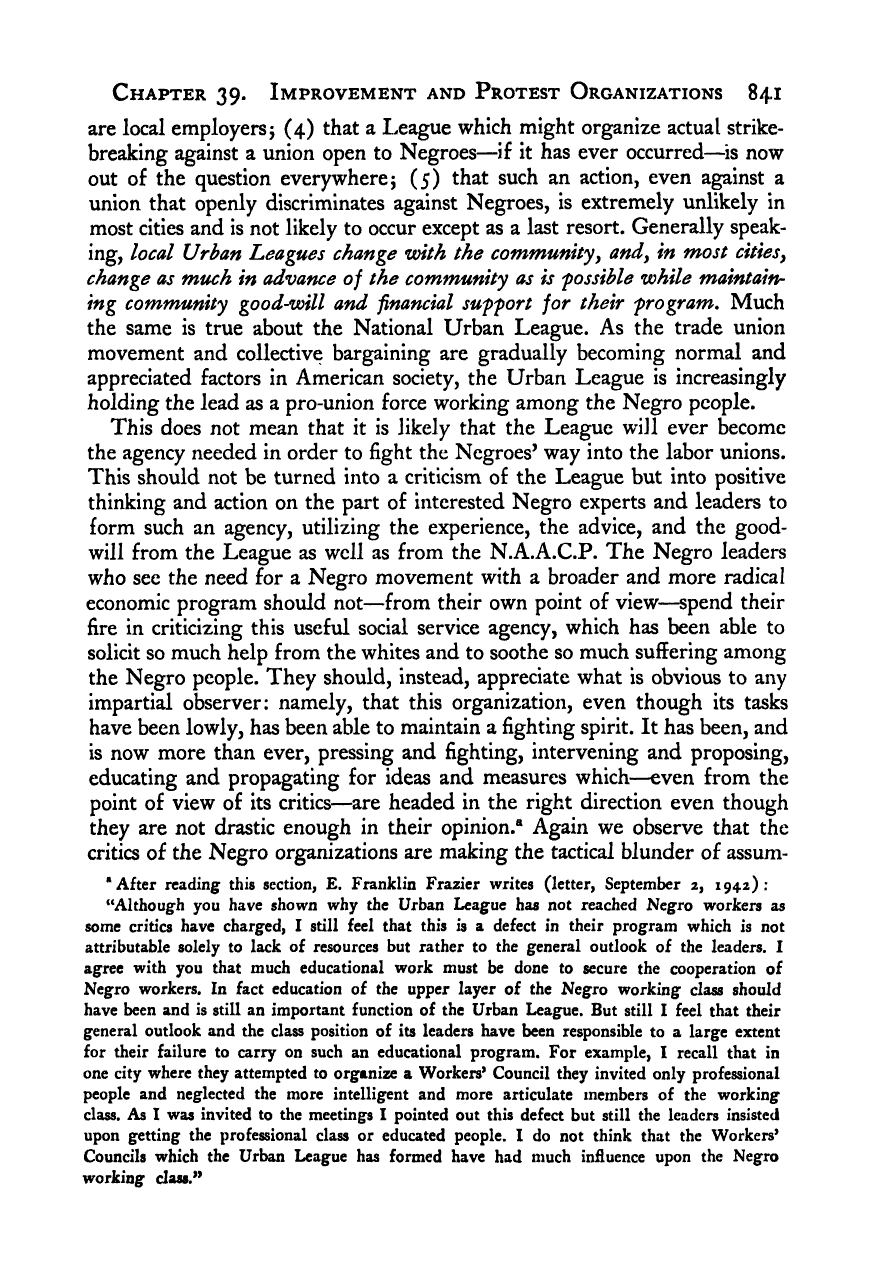Note: Gunnar Myrdal died in 1987, less than 70 years ago. Therefore, this work is protected by copyright, restricting your legal rights to reproduce it. However, you are welcome to view it on screen, as you do now. Read more about copyright.
Full resolution (TIFF) - On this page / på denna sida - IX. Leadership and Concerted Action - 39. Negro Improvement and Protest Organizations - 10. The Urban League

<< prev. page << föreg. sida << >> nästa sida >> next page >>
Below is the raw OCR text
from the above scanned image.
Do you see an error? Proofread the page now!
Här nedan syns maskintolkade texten från faksimilbilden ovan.
Ser du något fel? Korrekturläs sidan nu!
This page has never been proofread. / Denna sida har aldrig korrekturlästs.
Chapter 39. Improvement and Protest Organizations 84.1
are local employers j (4) that a League which might organize actual strike-
breaking against a union open to Negroes—if it has ever occurred—is now
out of the question everywhere; (5) that such an action, even against a
union that openly discriminates against Negroes, is extremely unlikely in
most cities and is not likely to occur except as a last resort. Generally speak-
ing, local Urban Leagues change with the community^
andy in most cities
change as much in advance of the community as is ’possible while maintaifv-
ing community good-will and financial support for their program. Much
the same is true about the National Urban League. As the trade union
movement and collective bargaining are gradually becoming normal and
appreciated factors in American society, the Urban League is increasingly
holding the lead as a pro-union force working among the Negro people.
This does not mean that it is likely that the League will ever become
the agency needed in order to fight the Negroes^ way into the labor unions.
This should not be turned into a criticism of the League but into positive
thinking and action on the part of interested Negro experts and leaders to
form such an agency, utilizing the experience, the advice, and the good-
will from the League as well as from the N.A.A.C.P. The Negro leaders
who see the need for a Negro movement with a broader and more radical
economic program should not—from their own point of view—spend their
fire in criticizing this useful social service agency, which has been able to
solicit so much help from the whites and to soothe so much suffering among
the Negro people. They should, instead, appreciate what is obvious to any
impartial observer: namely, that this organization, even though its tasks
have been lowly, has been able to maintain a fighting spirit. It has been, and
is now more than ever, pressing and fighting, intervening and proposing,
educating and propagating for ideas and measures which—even from the
point of view of its critics—are headed in the right direction even though
they are not drastic enough in their opinion.® Again we observe that the
critics of the Negro organizations are making the tactical blunder of assum-
* After reading this section, E. Franklin Frazier writes (letter, September 2, 1942);
“Although you have shown why the Urban League has not reached Negro workers as
some critics have charged, I still feel that this is a defect in their program which is not
attributable solely to lack of resources but rather to the general outlook of the leaders. 1
agree with you that much educational work must be done to secure the cooperation of
Negro workers. In fact education of the upper layer of the Negro working class should
have been and is still an important function of the Urban League. But still 1 feel that their
general outlook and the class position of its leaders have been responsible to a large extent
for their failure to carry on such an educational program. For example, I recall that in
one city where they attempted to organize a Workers* Council they invited only professional
people and neglected the more intelligent and more articulate members of the working
class. As I was invited to the meetings I pointed out this defect but still the leaders insisted
upon getting the professional class or educated people. I do not think that the Workers*
Councils which the Urban League has formed have had much influence upon the Negro
working class.**
<< prev. page << föreg. sida << >> nästa sida >> next page >>